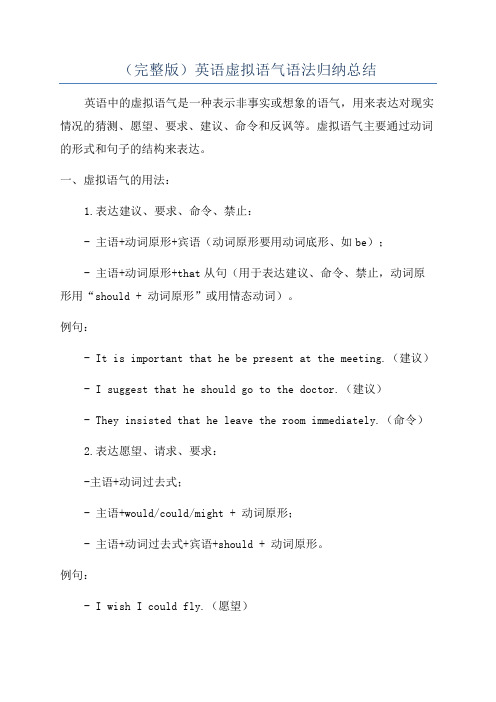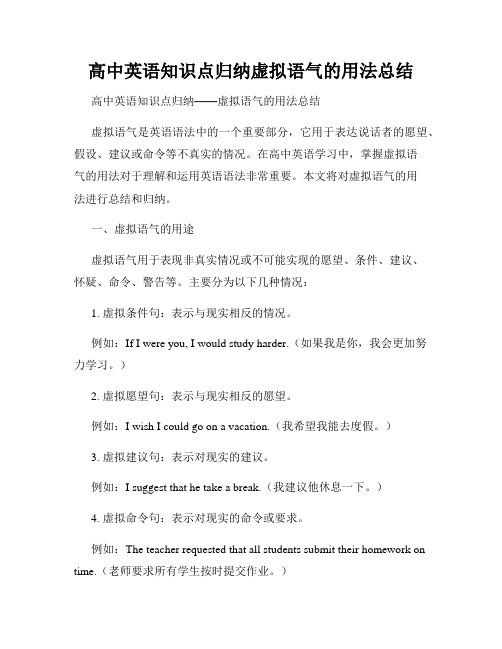高中英语语法-虚拟语气全总结
(完整版)英语虚拟语气语法归纳总结

(完整版)英语虚拟语气语法归纳总结英语中的虚拟语气是一种表示非事实或想象的语气,用来表达对现实情况的猜测、愿望、要求、建议、命令和反讽等。
虚拟语气主要通过动词的形式和句子的结构来表达。
一、虚拟语气的用法:1.表达建议、要求、命令、禁止:- 主语+动词原形+宾语(动词原形要用动词底形、如be);- 主语+动词原形+that从句(用于表达建议、命令、禁止,动词原形用“should + 动词原形”或用情态动词)。
例句:- It is important that he be present at the meeting.(建议)- I suggest that he should go to the doctor.(建议)- They insisted that he leave the room immediately.(命令)2.表达愿望、请求、要求:-主语+动词过去式;- 主语+would/could/might + 动词原形;- 主语+动词过去式+宾语+should + 动词原形。
例句:- I wish I could fly.(愿望)- I would appreciate it if you could help me.(请求)3.表示虚拟条件:- If条件从句中的谓语动词用过去完成时,主句用would/should/might/could + have + 过去分词;- If条件从句中的谓语动词用过去时,主句用would/should/could + 动词原形。
例句:- If I had known his phone number, I would have called him.(虚拟条件)- If you had listened to me, we could have finished the project earlier.(虚拟条件)4.表达建议、要求、祝愿:- If only内部称述 + 主语 + 过去式。
高中英语2025届高考语法复习虚拟语气知识讲解

高考英语语法复习虚拟语气知识讲解一、基础知识(一)什么是虚拟语气谓语动词的作用不仅可以表示动作的时间、状态、假设(情感),也是一种语气(mood)的表现形式,表明说话的目的和意图。
(语气包含陈述语气、祈使语气、虚拟语气、疑问语气)虚拟语气用于表示假设、愿望、建议、命令等非真实或虚拟的情况,即与真实相反。
上学的时候老师经常举的一个例子,"If I were you"因为我不可能是你,这是一种不可能存在的事实,所以这是个虚拟语句。
总而言之英语中的虚拟语气可以分为两大体系:一是表示与事实相反的,或者是假象的情形,通常由if引导,叫做虚拟条件句;另一个体系是在名词从句中使用虚拟语气,表示建议,命令或者要求等语气,类似于上述美剧常用的台词。
(二)虚拟语气的用法这一部分我们主要用虚拟语气在条件句中的用法作为讲解与现在事实相反:If I had a map, I would lend it to you.如果我有地图我就借给你。
(但我没有)与将来事实相反:If I were to do the job, I would do it in a different way. 要是我来做这工作,我会是另一种做法。
(言外之意不是我做这个工作,用虚拟表达是我做这份工作的可能性很低)与过去事实相反:If anything had happened, he would have let us know.如果发生了什么情况,他早就通知我们了。
(所以没事发生)它们的共性都是表示与事实相反或者实现可能性不大3.特殊情况①在极少情况下,从句的谓语动词用原形,主句的谓语动词可用陈述语气(比较官方,正式,大气的说法,口语很少使用)If that be the official view, it cannot be accepted.如果这是官方的看法,这是不能接受的。
②if可以省略,但是语序要改为倒装Were I Tom I would refuse.如果我是汤姆我会拒绝。
高中英语知识点归纳虚拟语气的用法和情况

高中英语知识点归纳虚拟语气的用法和情况虚拟语气是英语中的一种特殊语气,用于表达与事实相反、与现实相反或与说话人的愿望、建议、命令等相反的假设情况。
在高中英语学习中,掌握虚拟语气的正确用法对于理解和准确表达意思至关重要。
本文将归纳总结高中英语中虚拟语气的用法和情况。
一、虚拟语气的基本情况1. 过去虚拟语气(Subjunctive Mood)过去虚拟语气用于表示与现在事实相反的虚拟状态或行为。
例如:If I were you, I would study harder.如果我是你,我会更努力学习。
2. 现在虚拟语气(Subjunctive Mood)现在虚拟语气用于表示与过去事实相反的虚拟状态或行为。
例如:I wish I lived in a big city.我希望我住在一个大城市。
3. 将来虚拟语气(Subjunctive Mood)将来虚拟语气用于表示与现在或将来事实相反的虚拟状态或行为。
例如:If it should rain tomorrow, we would cancel the picnic.如果明天下雨,我们会取消野餐。
二、虚拟语气的具体用法1. 虚拟条件语句虚拟条件语句用于表示与现实相反的条件情况。
例如:If she were here, she would help you.如果她在这里,她会帮助你。
2. 虚拟愿望语句虚拟愿望语句用于表达对于现在或将来不可能实现的愿望。
例如:I wish I had more free time.我希望我有更多的空闲时间。
3. 虚拟建议语句虚拟建议语句用于表示对于过去的事情提出建议。
例如:I wish you had listened to me earlier.我希望你早点听我的话。
4. 虚拟命令语句虚拟命令语句用于表示对于过去的事情给出命令或要求。
例如:I demanded that he apologize immediately.我要求他立即道歉。
高中英语虚拟语气的用法归纳

高中英语虚拟语气的用法归纳以下是高中英语虚拟语气的用法归纳:虚拟语气是一种特殊的动词形式,表示假设、愿望、建议、命令、猜测等非真实的情况。
一、基本用法1. 与现在事实相反条件从句:If + 主语 + 动词过去式(be 动词用 were)主句:主语 + would/should/could/might + 动词原形例句:If I were you, I would study harder. (如果我是你,我会更努力学习。
)Wouldn't life be boring if we had everything we wanted? (如果我们想要什么就有什么,生活岂不是很无聊?)2. 与过去事实相反条件从句:If + 主语 + had + 过去分词主句:主语 + would/should/could/might + have + 过去分词例句:If I had known your phone number, I would have called you. (如果我知道你的电话号码,我就给你打电话了。
)Couldn't you have done better if you had tried harder? (如果你再努力些,难道不能做得更好吗?)3. 与将来事实相反条件从句:① If + 主语 + 动词过去式② If + 主语 + were to + 动词原形③ If + 主语 + should + 动词原形主句:主语 + would/should/could/might + 动词原形例句:If it rained tomorrow, we would stay at home. (如果明天下雨,我们就待在家里。
)If she were to come here tomorrow, I would be very happy. (如果她明天来这儿,我会非常高兴。
)If he should fail in the exam, how disappointed his parents would be!(要是他考试不及格,他父母该多失望啊!)二、固定搭配1. wish 后的宾语从句与现在事实相反:从句用一般过去时与过去事实相反:从句用过去完成时与将来事实相反:从句用 would/could + 动词原形例句:I wish I were as tall as you. (我希望我和你一样高。
虚拟语气知识点总结

虚拟语气知识点总结虚拟语气是英语语法中一个重要的知识点,它用来表示与事实相反或者不太可能实现的情况。
在使用虚拟语气时,我们需要注意动词的形式和句子的结构,下面将对虚拟语气的几个常见用法进行总结。
1. 虚拟语气表示与现在事实相反当我们需要表达与现在事实相反的情况时,可以使用虚拟语气。
主要有以下几种情况:a) If条件从句中,使用"were"来代替"was",无论主语是单数还是复数,例如:“If I were you, I would go.”b) 虚拟语气与过去时间有关,即主句动词过去时,从句使用过去完成时,例如:“I wish I had studied harder for the exam.”2. 虚拟语气表示与过去事实相反当我们需要表达与过去事实相反的情况时,可以使用虚拟语气。
主要有以下几种情况:a) 使用过去完成时来表示过去不可能实现的动作,例如:“I wish I had won the lottery.”b) 如果从句中的谓语动词是"be",则使用"were"来代替"was",例如:“If I were taller, I could reach the top shelf.”3. 虚拟语气表示建议、要求、命令当我们需要表示建议、要求或命令时,可以使用虚拟语气。
主要有以下几种情况:a) 表示建议时,可以使用"should"来引导虚拟语气,例如:“I suggest that you should take a break.”b) 表示要求时,可以使用"request"或"insist"等动词,结构为"(动词)+ that + 主语 + 动词原形",例如:“The teacher requ ested that the students be quiet.”c) 表示命令时,可以使用"order"或"command"等动词,结构同上,例如:“The captain ordered that all passengers fasten their seat belts.”4. 虚拟语气表示假设情况当我们需要表示假设情况时,可以使用虚拟语气。
高中英语知识点归纳虚拟语气的用法总结

高中英语知识点归纳虚拟语气的用法总结高中英语知识点归纳——虚拟语气的用法总结虚拟语气是英语语法中的一个重要部分,它用于表达说话者的愿望、假设、建议或命令等不真实的情况。
在高中英语学习中,掌握虚拟语气的用法对于理解和运用英语语法非常重要。
本文将对虚拟语气的用法进行总结和归纳。
一、虚拟语气的用途虚拟语气用于表现非真实情况或不可能实现的愿望、条件、建议、怀疑、命令、警告等。
主要分为以下几种情况:1. 虚拟条件句:表示与现实相反的情况。
例如:If I were you, I would study harder.(如果我是你,我会更加努力学习。
)2. 虚拟愿望句:表示与现实相反的愿望。
例如:I wish I could go on a vacation.(我希望我能去度假。
)3. 虚拟建议句:表示对现实的建议。
例如:I suggest that he take a break.(我建议他休息一下。
)4. 虚拟命令句:表示对现实的命令或要求。
例如:The teacher requested that all students submit their homework on time.(老师要求所有学生按时提交作业。
)5. 虚拟警告句:表示对现实的警告或威胁。
例如:If you don't stop talking, I will call the police.(如果你不停止讲话,我会报警。
)二、虚拟语气的形式1. 虚拟语气在动词的形态上表现为过去式(一般过去时或过去完成时)。
例如:I suggested that he go to the library.(我建议他去图书馆。
)2. 虚拟语气在动词的形态上表现为"were"而不是"was"。
例如:If I were you, I would apologize.(如果我是你,我会道歉。
)3. 虚拟语气在情态动词的用法上表现为"should" + 动词原形。
高一英语虚拟语气知识点
高一英语虚拟语气知识点高一英语学习中,虚拟语气是一个重要的语法知识点。
它用于表达虚拟、假设或非现实情况。
本文将介绍虚拟语气的用法、表示方法以及一些常见的注意事项。
1. 虚拟语气的用途虚拟语气常用于以下情况:- 表达与事实相反的假设情况:If I were you, I would help him.(假设我是你,我会帮助他。
)- 表达建议、命令、要求等非真实情况:The teacher suggested that Lisa study harder.(老师建议莉莎努力学习。
)- 表达对过去情况的惋惜、遗憾或批评:I wish I had studied harderfor the exam.(我希望我之前考试时学得更努力。
)2. 虚拟语气的表示方法虚拟语气有三种基本表示方法:- 动词过去式表示现在虚拟:If I were you, I would go to the party.(如果我是你,我会去参加派对。
)- would/could + 动词原形表示现在虚拟:If I had more time, I would visit my grandparents.(如果我有更多时间,我会去看望我的祖父母。
)- had + 过去分词表示过去虚拟:I wish I had known about the party.(我希望我早知道这个派对。
)3. 常见注意事项在使用虚拟语气时,还需要注意以下几点:- 在“if”引导的条件从句中,主句可以用“would/could/should/might +动词原形”表示虚拟情况。
- 在表达与过去事实相反的虚拟情况时,需要使用过去的虚拟形式。
- 在某些情况下,可以使用“should + 动词原形”表示建议或推测的虚拟语气。
- “wish”用于表达遗憾时,后面从句中的动作或状态实际上与现在事实不符,因此需要使用过去的虚拟形式。
总结:虚拟语气是英语学习中的重要知识点,它用于表达虚拟、假设或非现实情况。
高中英语虚拟语气知识点总结精华(附答案)
高中英语虚拟语气知识点总结精华(名师总结必考语法知识点)第一节语气英语的动词一般可带有三种不同的语气:陈述语气,祈使语气和虚拟语气。
不同的语气用动词的不同形式(有的还借助句法形式)来表示。
第二节虚拟语气的概念虚拟语气是一种特殊的动词形式,一是用来表示说话人所说的话不是一个事实,而是一种假设、猜测、怀疑等(在条件从句中或让步状语从句中);一是表示说话人的愿望、要求、命令、建议等(在宾语从句、表语从句、同位语从句)。
它能实现下列交际功能:a.用来表达一个假设或纯粹的意愿(这种假设或意愿在多数情况下是与事实相反或不太可能实现的。
b. 经常用来缓和语气,使之更加委婉、礼貌、得体,使句子带有推测性和尝试性。
c. 表示烦恼、不耐烦等情绪。
d. 表示适度的责备或批评。
e. 表示美好的祝愿或祝福。
学习虚拟语气在条件句中的用法之前我们必须清楚条件句的种类:条件句有真实条件句与非真实条件句(或称虚拟条件句)两种。
真实条件句所表的假设是可能发生或实现的,句中的条件从句与结果主句都用陈述语气。
如:If it doesn’t rain tomorrow, I wi ll go for a picnic. 假若明天不下雨,我就去野餐。
Oil floats if you pour it on water. 你如把油倒在水里,油就浮起来。
虚拟条件句所表的假设则是不可能或不大可能发生或实现的,句中的条件从句与结果主句皆须用虚拟语气。
第三节虚拟语气在条件句中NOTE:使用虚拟条件句要注意的几点:1.当条件状语从句表示的行为和主句表示的行为所发生的时间不一致时,被称为:错综时间条件句“,动词的形式要根据它所表示的时间作出相应的调整.If you had followed my advice , you would be better now.如果你听我的建议,你现在就会痊愈了.2.在条件句中,可省略if,把were ,had, should 提到句首,变为倒装句式.(后面详细讲解)If you had come earlier, you would have met him.Had you come earlier, you would have met him.1. 与现在事实相反的虚拟条件句,条件从句的谓语用动词的过去式(be的过去式用were), 主句的谓语用should (would, might,could)+动词原形。
高中英语虚拟语气知识点总结
高中英语虚拟语气知识点总结高中英语虚拟语气知识点总结虚拟语气是英语语法中一种用于描述假设、假想或可能性的语气。
在高中英语中,虚拟语气是一个相当重要的语法知识点。
本文将总结高中英语虚拟语气知识点,帮助学生更好地掌握虚拟语气的使用规则和技巧。
一、虚拟语气的定义及用途虚拟语气指的是表示假想、虚构、愿望、建议等情况的语气。
它强调实现的可能性很小或很远,或者根本就不可能实现。
虚拟语气通常使用“if”引导条件从句或用于表达思想、态度。
虚拟语气的用途主要有以下几个方面:1. 表示假想或虚构情况例如:If I were you, I would not do that.(如果我是你,我不会那么做。
)2. 表示可能性很小或很远例如:If you asked him, he might help you.(如果你问他,他可能会帮你。
)3. 表示愿望、要求或建议例如:I wish I could speak fluent English.(我希望我能说流利的英语。
)二、虚拟语气的形式虚拟语气形式主要有以下几种:1. 虚拟语气的过去式:在虚拟语气中,一般用过去式来表示对现在或未来的虚拟。
例如:If I had more time, I would read more books.(如果我有更多时间,我就会多看书。
)2. 虚拟语气的过去完成式:过去完成式用于表示“如果过去已经发生了某些事情,结果会是怎样”。
例如:If I had studied harder in high school, I would have gone to a better college.(如果我在高中时学习更努力,我就能进入更好的大学。
)3. 虚拟语气的“would + 动词原形”形式:“would +动词原形”形式通常用于表示愿望、要求、建议或者可能性。
例如:I wish you would stop smoking.(我希望你戒烟。
)If you would like to come, you are welcome.(如果你愿意来,欢迎你。
2025届高考英语虚拟语气知识点总结+课件
Homework
1. 完成高考汇编关于虚拟语气的练习题; 2. 用虚拟语气完成小诗。小诗的首句已给出。
If I were a bird, I would fly into the sky. ......
Thanks
为什么不用If I am a boy? 为什么不用If I was a boy?
虚拟语气是由句中的谓语动词的特殊形式表示出来的。
动词语气
1、虚拟语气:虚拟语气表示说话人的主观愿望、猜疑、建议或与事实不符 的假设等,而不表示客观存在的事实。 2、虚拟语气是由句中的谓语动词的特殊形式表示出来的。
你会辨认虚拟语气了吗?
对现在的虚拟条件从句
If there were no subjunctive(虚拟语气), English would be much easier.
从句
主句
If + 主语 + 过去式(were),主语 + should/would/could/might + 动词原形
来练一练
1. If there ____w__e_r_e____ (be) no air or water,there ____w_o_u__ld__b_e_____no living things on the earth.
如果我是个男孩 我想我能够明白 爱一个女孩是什么样的滋味 我发誓我会是一个好男人 我会倾听她, 因为我了解
When you loose the one you wanted 失去了你爱的人那有多痛苦
Cause he’s taken you for granted
因为他把你视作理所当然
And everything you had got destroyed! 你的一切都被毁
- 1、下载文档前请自行甄别文档内容的完整性,平台不提供额外的编辑、内容补充、找答案等附加服务。
- 2、"仅部分预览"的文档,不可在线预览部分如存在完整性等问题,可反馈申请退款(可完整预览的文档不适用该条件!)。
- 3、如文档侵犯您的权益,请联系客服反馈,我们会尽快为您处理(人工客服工作时间:9:00-18:30)。
虚拟语气在非真实条件句中①错综时间条件句:当条件状语从句表示的行为和主句表示的行为所发生的时间不一致时,被称为错综时间条件句,动词的形式要根据它表示的时间作出相应的调整。
如:If you had followed my advice just now, you would be better now.If you had studied hard before, you would be a college student now.②if省略句在条件句中可以省略if, 把were, had, should提到句首,变成倒装句式。
如:If I were at school again, I would study harder.→Were I at school again, I would study harder.如果我还有上学的机会,我会更加努力学习。
If you had come earlier, you would catch the bus.→Had you come earlier, you would catch the bus.如果你来得早点,你就能赶上公共汽车。
If it should rain tomorrow, we would not go climbing.→Should it rain tomorrow, we would not go climbing.如果明天下雨的话,我们就不能登山去了。
③用介词代替条件状语从句常用的介词有with, without, but for。
如:What would you do with a million dollars? (=if you had a million dollars)如果你有100万元,你会做什么?We couldn’t have finished the work ahead of time without your help. (=if we hadn’t got your help) 没有你的帮助,我们不可能提前完成这项工作。
Without your help, we couldn’t have finished the work ahead of time.= But for your help, …= If it had not been for your help, …= Had it not been for you help, …没有你的帮助,我们不可能提前完成这项工作。
④含蓄条件句有时在虚拟语气中并不总是出现if引导的条件句,而是通过其他手段来代替条件句。
如:I was ill that day. Otherwise, I would have taken part in the sports meeting. (副词)He telephoned to inform me of your birthday, or I would have known nothing about it. (连词)A man who stopped drinking water would be dead in about seven days. (定语从句)I might have given you more help, but I was too busy. (连词)Everything taken into consideration, they would have raised their output quickly. (独立主格结构) ⑤even if, even though也可用于虚拟语气,其形式与if 从句在虚拟语气中的形式相同。
习题1. If my lawyer___here last Saturday, he___me from going.A.had been, would have preventedB.had been, would preventC.were, would preventD.were, would have prevented2. If it___for the snow, we___the mountain yesterday.A.were not, could have climbedB.were not, could climbC.had not been, could have climbedD.had not been, could climb3. Without electricity(电) human life___quite difficult today.A. isB. will beC. would have beenD. would be4. I didn’t see your sister at the meeting, if she___, she would have met my brother.A. has comeB. did comeC. cameD. had come5. When the pencil is partly in a glass of water, it looks as if it___.A. breaksB. has brokenC. were brokenD. had been broken6. He hesitated(犹豫) for a moment before kicking(踢) the ball. Otherwise he___a goal.A. had scoredB. scoredC. would scoreD. would have scored7. ___right now, she would get there on Sunday.A.Would she leaveB.If she leavesC.Were she to leaveD.If she had left8. Had he worked harder, he___the exam.A.must have got throughB.would have got throughC.would get throughD.could get through9. He must have had an accident, or he___then.A.would have been hereB.had to be hereC.should be hereD.would be here10. ___for my illness I would have lent him a helping hand.A.Not beingB.Had it not beenC.Without beingD.Not having been11. We didn’t know his telephone number, otherwise we___him.A.would have calledB.must have telephonedC.would telephoneD.had telephoned虚拟语气(1)复习题1.He ___you more help, even though he was very busy.A. might have givenB. might giveC. may have givenD. may give2.___for your laziness(懒惰), you could have finished the assignment(任务) bynow.A. Had it not beenB. It were notC. weren’t itD. Had not it been3.If I hadn’t stood under the ladder(梯子) to catch you when you fell, you ___now.A. wouldn’t be smilingB. couldn’t have smiledC. won’t smileD. didn’t smile4.If it ___Professor Johnson’s recommendation(推荐), I wouldn’t have been admitted to the graduate school(研究生学院).A. were not forB. had not been forC. were notD. had it not been5.If we do not develop a new kind of car, air pollution ___even more dangerous.A. should have becomeB. will becomeC. would have becomeD. must have become6.But for the stormy weather, we ___earlier.A. should arriveB. shall arriveC. should have arrivedD. shall have arrived7.If we ___their terms(条款,条件), we would go bankrupt(破产).A. acceptB. should acceptC. had acceptedD. are to accept8.John would never have gone to the hospital ___that Tom would be there, too.A. he did not knowB. if had he knownC. had he knownD. he would have known9.Had he been more careful, he ___that accident.A. would avoidB. would have avoidedC. avoidedD. should avoid10.But that he came to help me, I ___there earlier.A. could not arriveB. could not have arrivedC. did not arriveD. can not arrive11.She could look more attractive(有魅力的,吸引人的) but she ___no attention to her clothes.A. paysB. was payingC. paidD. had paid12.If I ___in his place, I would do that, too.A. wasB. wereC. amD. had been虚拟语气(2)——虚拟语气在名词从句中1.在由suggest, demand, require, request, insist, order, command, propose等表示建议、请求、命令、愿望等动词或其同根词引出的名词从句中,名词从句虚拟句的谓语变化的形式只有一条规律——名词从句虚拟句无论其主句的谓语动词时何种形式,从句的谓语形式均为should+动词原形,其中should可以省去。
